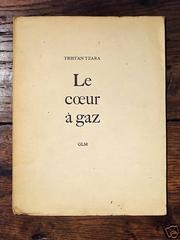| The Gas Heart | |
|---|---|
 | |
| Written by | Tristan Tzara |
| Characters | Mouth Ear Eye Nose Neck Eyebrow |
| Date premiered | 1921 |
| Place premiered | Galerie Montaigne Paris |
| Original language | French |
| Genre | Dadaism |
The Gas Heart or The Gas-Operated Heart[1] (French: Le Cœur à gaz) is a French-language play by Romanian-born author Tristan Tzara. It was written as a series of non sequiturs and a parody of classical drama—it has three acts despite being short enough to qualify as a one-act play. A part-musical performance that features ballet numbers, it is one of the most recognizable plays inspired by the anti-establishment trend known as Dadaism. The Gas Heart was first staged in Paris, as part of the 1921 "Dada Salon" at the Galerie Montaigne.
The play's second staging, as part of the 1923 show Le Cœur à barbe ("The Bearded Heart") and connected to an art manifesto of the same name as the latter, featured characteristic costumes designed by Sonia Delaunay. The show coincided with a major split in the avant-garde movement, which, in 1924, led Tzara's rivals to establish Surrealism. Opposing his principles to the dissident wing of Dada, represented by André Breton and Francis Picabia, Tzara rallied around him a group of modernist intellectuals, who endorsed his art manifesto. The conflict between Tzara and Breton culminated in a riot, which took place during the premiere of The Gas Heart.
- ^ Johanna Drucker, The Visible Word: Experimental Typography and Modern Art, 1909–1923, University of Chicago Press, Chicago & London, 1994, p.223. ISBN 0-226-16501-9